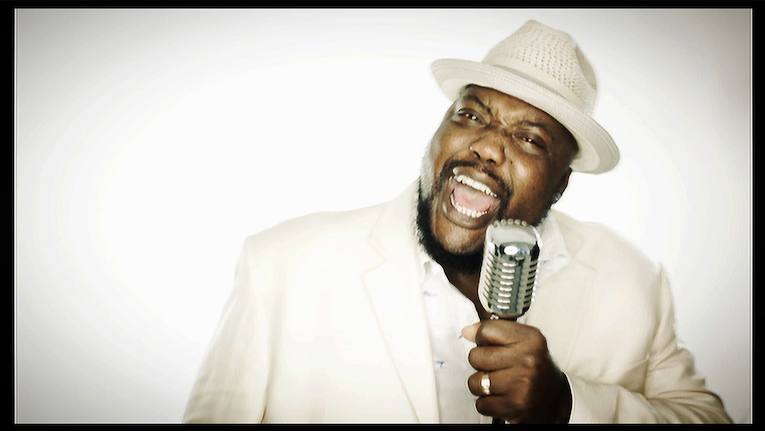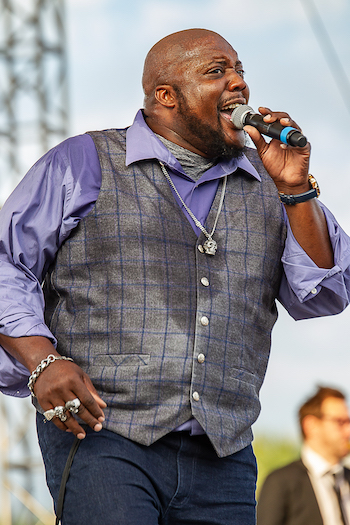
Sugaray Rayford
By Martine Ehrenclou
The Blues Foundation honored Sugaray Rayford as the 2020 “B.B. King Entertainer of the Year” and “Best Soul Blues Male Artist” for both 2019 and 2020. This powerhouse, soulful singer and songwriter also earned a 2020 Grammy nomination for Best Contemporary Blues Album for his critically acclaimed release, Somebody Save Me, produced by Eric Corne and released by Forty Below Records.
With a vocal style that’s reminiscent of Teddy Pendergrass, Muddy Waters, and Otis Redding, Sugaray blends blues, jazz, gospel and plenty of soul into his music. Originally from Texas, he was one of the lead vocalists for The Mannish Boys, singing nine songs on their album Double Dynamite that won a BMA for Best Traditional Blues Album 2013. He also has six solo albums to his name, and his 2017 release The World That We Live Ingarnered him four BMA nominations.
A rising star in the international blues community, Sugaray Rayford is known for his live shows, dynamic performances and vocal style. He is releasing a new single “Homemade Disaster” on August 7th 2020 via Forty Below records and produced by Eric Corne.
Martine Ehrenclou: Congratulations on your Grammy nomination for Best Contemporary Blues Album for Somebody Save Me. We love the album.
Sugaray Rayford: Thank you!
Martine: And all the Blues Music Awards and the B.B. King Entertainer of the Year Award, Soul Blues Male Artist of the Year and the Muddy Awards. You’ve just raked them in.
Sugaray: I’ve been very lucky. It’s a beautiful album and great team. The Grammy nomination came out of the blue. I was literally shocked. When the B.B. King Entertainer award came through, I’d been up for it about five times, it was amazing. We had to do the virtual ceremony. I really wanted to be there but I feel blessed.
Martine: You have a new single coming out “Homemade Disaster.” It’s a great song. Can you tell me about it?
Sugaray: “Homemade Disaster,” it’s a beautiful song. Eric (Corne) wrote it and he took some of my thoughts and inspiration because I can’t sing anything I don’t really believe in. He took that to heart. We were thinking about what was going on at that time in the world. When we did this album, it was originally supposed to go on to Somebody Save Me album. The album was already a stretch from the traditional blues stuff and even some of the non-traditional blues stuff. Eric and I thought that maybe the song was just a little far, at that particular time, for the album so we pulled it. We weren’t sure how the blues world or the soul world or how the critics or the fans would react because when the album comes on, it’s “The Revelator.” It’s almost a hip-hop thing.
Martine: It reminded me of 90s hip-hop.
Sugaray: Yeah, we’d purposely done it that way.
Martine: I loved it.
Sugaray: Well, thank you. I came up as a blues guy for a while and I’ve been stretching it out but I made sure to let people know, I said, “The world we live in is not a blues album. It’s a soul album.” When I got with Eric, I wanted to continue that arc and that trajectory. I wanted to make sure to keep a foot wrapped in the blues but I still wanted to push that soul with the rock-ish band but with huge gospel blues on top.

Photo: Jim Hartzell
When we listened to “Homemade Disaster,” we really liked it, the way it flows, the words. (Sings) “Wait a minute. Baby just a minute, sliding down a slippery slope on one ski.” Now with COVID and everything going down, we’re like, “Homemade Disaster” is actually a really, really good song. What are we going to do with it?” We’re already working on the new album. We said, “I don’t think we should release that album this year because it would just be kind of a waste.” I saw there’s some bands releasing albums this year. But how can you do an album if you don’t have any touring behind it? We’re like, “Well, let’s release it as a single.” We think that it’s strong enough to sell on its own as a single. I was like, “Okay, cool.”
Martine: You’ve said that it’s all about the story for you. Can you tell me about the story with “Homemade Disaster”?
Sugaray: It’s kind of an interloper story. It’s almost like Tarantino’s Four Rooms (movie). It has several different stories. The song is like a call to be awake or awoke as young folks say. It’s a rip roaring, galivanting, loosely- told story of a couple buddies, their lives in quick succession. It’s literally a few stories added together but it is always a bit of a disaster, and that’s life. You get all the best plans in the world and they’re pretty much a waste of your time. That’s what the song’s really about. In every lyric that comes up or every verse, the overview is–we tried to do this, we wanted to do that, but this is what really happened. It’s a “Homemade Disaster.”
Martine: Something everybody can relate to.
Sugaray: Yeah. That’s the whole thing about writing and about life. We’re all human beings and we all go through the same emotions.
Martine: Tell me about the writing process.
Sugaray: Eric wrote these songs. I was out on the road. That year, we did like 225 shows, so I couldn’t be here and writing at the time. I was like, “Man, listen. I’ve got three hours of sleep and then I’ve got to be in Lithuania.” I was just getting ideas. I was like, “Hey, man, what about this?” I’m more of a journal writer. I write down what is happening to me or thoughts and they’re not necessarily songs but they’re great ideas. I guess you would say they’re templates. Eric is amazing with the details. He is an amazing songwriter. I’m one of those people who does not sing songs that I don’t believe in and if I don’t just believe in it, I just can’t do it.
Martine: That really shows in your in your vocals and performances. You’re 100% in it.
Sugaray: I think that the audience deserves that. I mean, anyone can tell a story. You have to have the emotion behind it. A sense of realness. That’s just the way I’ve always been and I think some of that is because I grew up in gospel. In gospel, we used to have a saying—“You can sing a lie just as easy as you can tell a lie.”
Martine: And people know it too.
Sugaray: Yes, and people know it. There you go. Whether or not you have one music iota in your body, you can tell. Nature has given us that sixth sense and things happen to people and they say, “I knew that was going to happen and I could feel it in my gut.” Music is the same way. You can feel when someone is singing. I’m not talking about if they have a good voice. I mean, if you have three or four octaves, you can sing. To me, that sounds real pretty, but at the same time, listen to Sam Cooke or Aretha Franklin or Joe Cocker singing.
I hear these young people on American Idol and The Voice, they’re doing Sam Cooke. They’re doing all these runs—’vocal gymnastics’ we used to call it.You miss what the song was about. The melody was great, but did you hear the conviction behind his voice when Sam Cooke sings “A Change Is Gonna Come”? He only had one and a half octaves. It’s not about octaves and I think a lot of young singers today have gotten away from the song, they’re just so into (sings scales), “Oh, oh, oh, oh”. (Laughter)
Martine: (Laughter) You are so right. I think people get impressed by that initially.
Sugaray: Oh, they do. Initially you do, but if you think about it, they do singles and pretty much that’s it. Because if you’re doing a full 90-minute concert, they’ve got to have a million props behind them and that will get old really fast.
Martine: You grew up singing gospel. It has to come from the soul, the spirit, to move people. Did you learn that in the church?
Sugaray: Oh, yes. I’m from the old Black church from down South, East Texas on the Louisiana border. Not only did it have to come from the right places, it had to be moving. It had to be right because all Black folks would come up to you right there and say, “Maybe not everybody is supposed to sing. Some people are supposed to be the ushers.” There was no, “I’ll support your back and good job.” No. If you sucked, they will come tell you. That’s why you’d be terrified to sing for Black audiences. There was no, “I’ll support your back with encouragement”. If you suck, someone is going to tell you. (Laughter)
Martine: (Laughter) I can’t imagine you’ve ever heard that at any of your shows.
Sugaray: I heard it from my mother because she was probably the greatest singer I’ve ever heard in my life, a singer and dancer. I wasn’t her son, in jest, because I couldn’t sing or dance. (Laughter)
Martine: (Laughter) You sure can now.
Sugaray: All this is new territory for me. I’m a blues/soul working guy and have great management, a good record company and an unbelievable booking agency and all these awards and stuff, all in a short period of time. And then, dealing with the cancer with my wife and the COVID, it all kind of came crushing down at one time. So, I’m finding my way. Crazy, but it’s been amazing.
Martine: Maybe trying to find your footing in all of it.
Sugaray: Yeah. I’m always going to just be me. As you move up the ladder is a whole other question, “How do I be me without trying to crush people, because I’m not that person.” I believe in calmer, love, love. It gets scary because the further you go up this ladder the more corporate it gets, if I can say that without sounding nasty.
Martine: I know what you mean.
Sugaray: I tried to surround myself with people who are warm, who are true and real, because I’m a man of my word. I believe in karma. That’s my religion, karma, and I try to treat everyone that way and I want the people that work with me to treat everyone that way. I want to keep that going. It’s a little scary. My wife has been my manager for 20 some odd years.

Martine: How is Pam doing?
Sugaray: She’s getting better, but now she’s got to go in to have back surgery.
Martine: I’m sorry.
Sugaray: The type of cancer she had is multiple myeloma, the blood and bone cancer, so it really did a number on the bones and stuff in her back. She had epidurals that didn’t work, so now they’re going to go in and remove one of the discs in her back and hopefully that’ll work. If that doesn’t work, then she’ll have a second surgery where they fuse her back. But the cancer part, she’s beaten that part. She’s beaten that back, so hooray! My wife is more of a marine than I ever was. She’s a tough old bird and I love that.
Martine: It’s been a while since you’ve been touring. What’s it been like for you not touring because of COVID? You’ve got more stuff going on with Pam’s recovery so it hasn’t just been about the pandemic.
Sugaray: The COVID sucks mostly for me because of my band. I’m one of those people I worry about everybody but me. But I’ve been worried about the band because we’re full time musicians. The guys in my band don’t have other jobs. On the other side, this should have been my year to really blow up with the Grammy nomination and all the other awards and nominations.
But I couldn’t be sad because at the same time the COVID made it possible so I could be home with Pam. With what she was going through, there’s just no way I could have not been here. The chemo and radiation were one thing but she had to do a full stem cell replacement, so they had to take her immune system down to zero and then rebuild it with stem cells. They’re doing stem cell research and found that people will live 15 to 16 years and live a good life.
Martine: That’s good news.
Sugaray: Not everybody gets to do it because it’s unbelievably expensive. But my wife, being a nurse practitioner and having had her own practice, and has a Masters of Science in Nursing for over 40 some years, she has very good insurance. Otherwise, there’s no way we could have afforded the treatment that she’s gotten, which literally saved her life.
The COVID actually had a silver lining for me. It made it where I could be home. Before she was like, “I have my daughter” and I’m like, “No. I need to be here.” My wife is tough but after having gone through all this, she’s like, “Oh, thank God you’re here, Baby.” There’s no way I could have been halfway around the world with what was going on. This was something beyond serious. COVID made it possible for me to be here through her entire cancer trial and now even through her recovery.
Martine: A gift for sure. What’s next for you? Are you still going to be touring in November to Switzerland or has everything been cancelled because of the pandemic?
Sugaray: Switzerland has been cancelled because as Americans we can’t go to Europe. Right now there’s nothing. I mean, all the stuff has potentially been rebooked for 2021 and beyond. There’s a full schedule. I think we’ll start March, April, May. We have Norway, France, Portugal, Spain, I think Germany, Switzerland, Sweden. There’s dates all over the U.S. There’s dates all over Canada but I don’t know if any of that’s going to actually happen.
Martine: I hope for you that it does.
Sugaray: Me too. What people don’t realize is that musicians are really hurting. We’re probably some of the worst hurt. We were the first ones out of work and we’ll be the last ones to go back to work. So, restaurants that complain and say, “We only have 50%.” I’m like, “Dude, we can’t even do 50%.” That’s why people are doing virtual shows or singing on their back porch.
Martine: Concert drive-ins too.
Sugaray: Drive-ins. My manager was talking about it. Believe me, I miss being on stage, sweating on stage, and I miss seeing people dance and smile. It’s my fuel when I’m on stage. That’s why I tell people it’s not a concert–it’s a party. I come to enjoy you as much as you enjoy the party.
Martine: It’s been great talking with you and I really appreciate you taking the time to talk with me today.
Sugaray: Anytime. I’m here. If I can help, let me know. Thank you very much.
Order link for Somebody Save Me
Sugaray Rayford Online

Leave A Comment